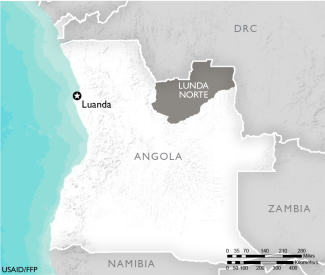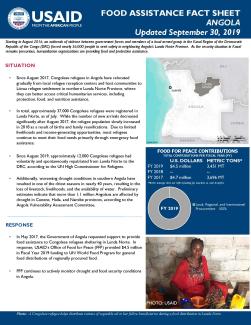September 30, 2019
Starting in August 2016, an outbreak of violence between government forces and members of a local armed group in the Kasaï Region of the Democratic Republic of the Congo (DRC) forced nearly 36,000 people to seek safety in neighboring Angola’s Lunda Norte Province. As the security situation in Kasaï remains precarious, humanitarian organizations are providing food and protection assistance.
Situation
- Since August 2017, Congolese refugees in Angola have relocated gradually from local refugee reception centers and host communities to Lóvua refugee settlement in northern Lunda Norte Province, where they can better access critical humanitarian services, including protection, food, and nutrition assistance.
- In total, approximately 37,000 Congolese refugees were registered in Lunda Norte, as of July. While the number of new arrivals decreased significantly after August 2017, the refugee population slowly increased in 2018 as a result of births and family reunifications. Due to limited livelihoods and income-generating opportunities, most refugees continue to meet their food needs primarily through emergency food assistance.
- Since August 2019, approximately 12,000 Congolese refugees had voluntarily and spontaneously repatriated from Lunda Norte to the DRC, according to the UN High Commissioner for Refugees.
- Additionally, worsening drought conditions in southern Angola have resulted in one of the driest seasons in nearly 40 years, resulting in the loss of livestock, livelihoods, and the availability of water. Preliminary estimates indicate that more than 1.1 million Angolans are affected by drought in Cunene, Huila, and Namibe provinces, according to the Angola Vulnerability Assessment Committee.
Response
- In May 2017, the Government of Angola requested support to provide food assistance to Congolese refugees sheltering in Lunda Norte. In response, USAID’s Office of Food for Peace provided $4.5 million in Fiscal Year 2019 funding to UN World Food Program (WFP) for general food distributions of regionally procured food.
- FFP continues to actively monitor drought and food security conditions in Angola.
Food for Peace Contributions
Total Contributions:
| U.S. Dollars | Metric Tons | |
|---|---|---|
| Fiscal Year 2019 | $4.5 million | 3,451 MT |
| Fiscal Year 2018 | --- | --- |
| Fiscal Year 2017 | $4.7 million | 3,696 MT |


